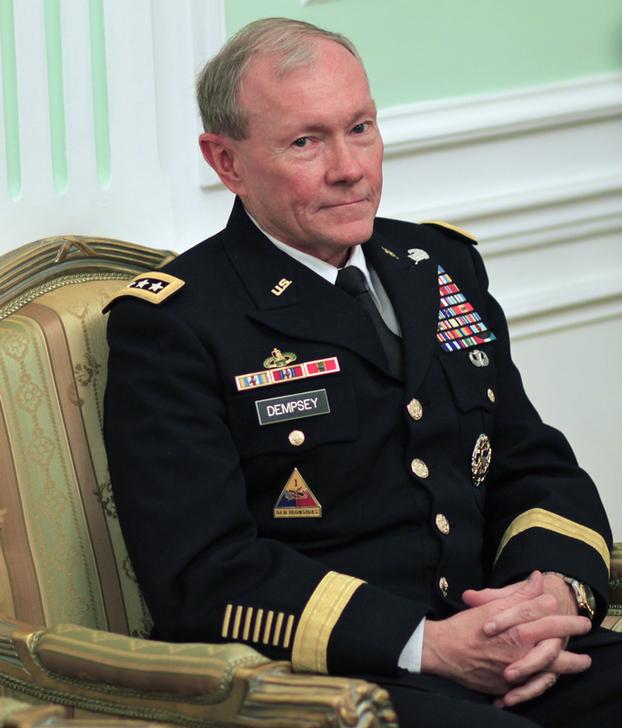Latest NEWS
- Aswat Masriya, the last word
- Roundup of Egypt's press headlines on March 15, 2017
- Roundup of Egypt's press headlines on March 14, 2017
- Former Egyptian President Hosni Mubarak to be released: lawyer
- Roundup of Egypt's press headlines on March 13, 2017
- Egypt's capital set to grow by half a million in 2017
- Egypt's wheat reserves to double with start of harvest -supply min
- Roundup of Egypt's press headlines on March 12, 2017
U.S.-Egypt military ties will depend on Egypt's actions - U.S. general

U.S. Chairman of the Joint Chiefs of Staff General Martin Dempsey in Cairo February 11, 2012. REUTERS/Khalil Hamra)
By Missy Ryan
BRUSSELS (Reuters) - The future of U.S. military ties with Egypt, curtailed after a crackdown on opponents by the army-backed leaders, will depend on the actions of the future government, the top U.S. military officer said ahead of Egyptian elections next week.
"I think we should maintain a relationship with the U.S. military and Egyptian military. I think that that relationship will be affected by their actions and whether they make progress on their political transition," said General Martin Dempsey, chairman of the U.S. Joint Chiefs of Staff.
"I think that (the military-to-military) relationship should largely be defined by our common interests. We have a lot of common interests in particular in countering terror," Dempsey told a small group of reporters during a visit to Brussels for talks with NATO officials.
Although presidential elections on Monday and Tuesday could provide the country's leaders new legitimacy, many Obama administration officials question whether Egypt should again become the premier U.S. partner in the Arab world.
U.S. support for Cairo was upended by the political transformations triggered by the 2011 popular uprising that toppled President Hosni Mubarak.
Last month, the Obama administration announced it would resume some military assistance suspended when the Egyptian army ousted the elected Islamist president, Mohamed Mursi, last year. Washington also said it would provide attack helicopters to help Egypt fight militants based in the Sinai peninsula.
General Abdel Fattah al-Sisi, who is expected to become Egypt's next president, told Reuters last week the West risked letting militant groups in places like Egypt, Libya and Syria spread beyond the region if it did not act decisively to help fight them.
Dempsey spoke of common Egyptian and U.S. interests in fighting militants, pointing to the growing threat in the Sinai peninsula and from the turmoil in neighboring Libya.
U.S. officials say last month's move to resume some aid was a calibrated step to help Egypt fight insurgents rather than a sign of tolerance for the harsh treatment of dissent.
Egypt has cracked down on the Muslim Brotherhood, the Islamist party that propelled Mursi to power, and other opposition groups. Western officials have condemned mass death sentences passed on Brotherhood supporters.
The Obama administration has repeatedly criticized such actions and continues to withhold hundreds of millions of dollars more in aid, along with other hardware that Egypt had requested, including Harpoon missiles and fighter jets.
Dempsey said he was confident Egypt would use the sophisticated U.S. weapons for their intended purpose and that Washington would check that they were not used to commit rights abuses.
"If they were to use them for purposes that violated the end-use agreement, then we have the ability to interdict the supply chain and that system would not be much use to them any longer," Dempsey said. (Reporting By Missy Ryan; Editing by David Storey and Mohammad Zargham)










